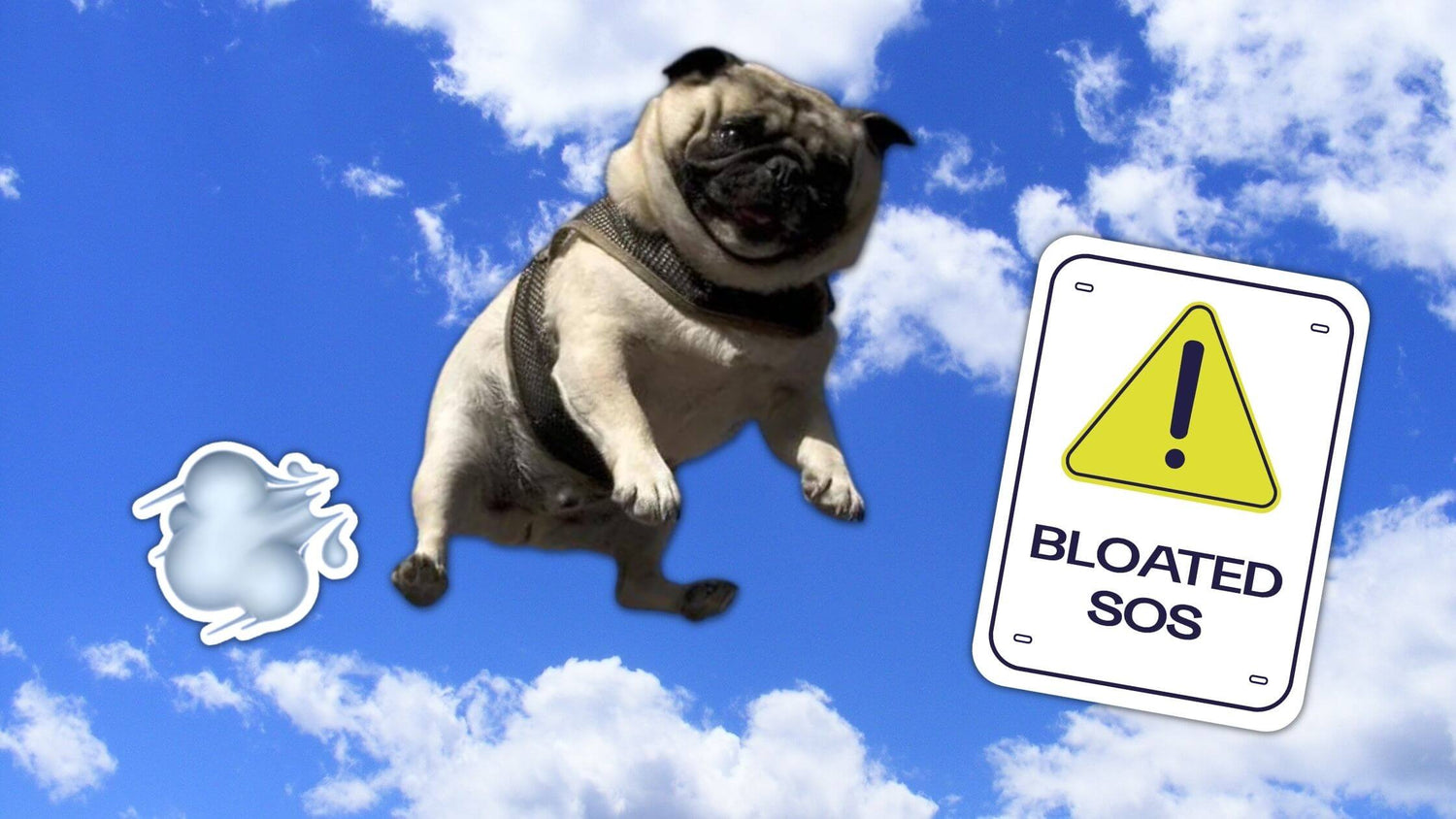Bloating is the most common digestive symptom that the majority of people across the world will experience multiple times in their lives. Some people are more prone to bloating than others due to a number of lifestyle, dietary, genetic, and medical factors.
Most people find that there are multiple factors contributing to their digestive issues, which may include bloating and excessive gas (on both ends!). As a result, they’re constantly trying to identify the cause of their digestive concerns and find the best ways to manage their symptoms.
Despite there being many obvious and well-known causes of bloating, many individuals find that they bloat randomly without any particular cause. Random bloating can occur at any time of the day and at any stage of life, regardless of what you are doing.
Often, random bloating can be more frustrating than expected bloating because it occurs out of nowhere, and you are often unprepared and don't know how to deal with it. In this article, we are going to give some of our top tips and strategies for managing random bloating. We will provide some natural remedies for gas relief, so you have lots of things to try when your digestive system is playing up.
Before we get into our top tips and natural remedies for bloating, let’s first discuss what bloating is and its key symptoms.
What Is Bloating?
Bloating describes the feeling of fullness or tightness in the abdomen that may come and go. Most of the time, this uncomfortable feeling makes you feel slightly swollen and puffy around your lower abdomen, and you might also experience a bit of cramping when you’re bloated.
What Are the Symptoms of Bloating?
Bloating usually manifests as the feeling of abdominal fullness and tightness with visible distension in the abdomen. It’s often associated with excess gas, which might lead to an increase in burping and flatulence.
Many people who experience bloating also find that they get abdominal cramps and pains that are only relieved by going to the toilet or lots of burping and farting! It’s often mistaken for weight gain or fat gain.
Although bloating is a completely normal and often innocent digestive issue, it’s important to be aware of your body and take notes when something doesn’t feel quite right. Bloating can sometimes be a symptom of more serious digestive issues, such as Crohn’s disease or even bowel cancer.
If you are experiencing constant bloating with extreme symptoms that are seriously affecting your quality of life, make sure to consult a doctor, registered dietician, or specialist gastroenterology nurse so they can perform various investigations to identify the root cause of your issues and provide you with the appropriate treatments.
Why Do I Bloat Randomly?
As we mentioned above, there is an endless list of things that can cause or worsen bloating. Because there are so many different causes of bloating, we have decided to split them into different categories - lifestyle, dietary, and medical conditions.
Alongside lifestyle, dietary, and health-related factors, it is also thought that your genetics can influence your predisposition to IBD, one of the most common causes of bloating. We won’t go too far into genetics in this article, but if you are interested, there is lots of great research online about this subject, and it’s all very fascinating!
Lifestyle factors that can cause random bloating
You might think that you randomly get bloated for seemingly no reason at all. However, if you take a look into your lifestyle and daily habits, you might find a sneaky culprit causing your digestive issues.
Some of the potential lifestyle-related causes of bloating include:
- Being sedentary for long periods of time (such as if you have an office job, take very few steps a day, or don’t exercise daily)
- Travelling, where you’re sitting down for extended periods of time and your usual diet goes out of the window
- Being a woman with a menstrual cycle, where your hormones and prostaglandin levels are naturally fluctuating over the course of the month (most women find that they bloat more in the days leading up to their period and during their period)
Dietary factors that can increase the risk and severity of bloating
Diets can change all the time, and most of the time, we don’t notice when our diets change ever so slightly. For example, attending more social events than usual, travelling long term, working extra hours in the office, feeling extra stressed, or changing your dietary preferences and practices can all contribute to changes in your food and fluid intake.
Because diet often falls by the wayside when things get busy or challenging in life, you might find that you end up feeling bloated, gassy, and sluggish during these periods of your life. These seemingly minor and unnoticeable changes in your lifestyle and diet can significantly impact not just your digestive health but your health as a whole.
Here are some common diet-related factors that can contribute to abdominal bloating and water retention in the body
- Eating more food than usual or eating your meals close together (simply eating a higher volume of food can cause abdominal distension as your digestive tract expands to accommodate this food)
- Eating lots of gassy foods like cruciferous vegetables, beans, lentils, salty foods, and foods high in saturated fats (more gas in your digestive tract means more bloating, burping, and flatulence)
- Consuming fizzy drinks like soda or sparkling water, which increases the volume of gas in your digestive tract
- Dehydration caused by not drinking enough water throughout the day
- Excessive alcohol intake (because alcohol is a diuretic, it causes you to urinate more, leading to dehydration and water retention in the gut)
Medical and health-related causes of random bloating
If your bloating is caused by a medical condition or health issues, it might not feel so random. Many people with chronic health issues find that bloating is one of their most frequent symptoms, and they aren’t surprised when they wake up with a distended abdomen.
However, if you don’t have any specific diagnoses but find that you are bloating all the time, seemingly for no reason at all, it might be worth heading to your General Practitioner to get some investigations. It could be that you have an underlying medical condition causing your bloating that you are currently unaware of, and your doctor will be able to perform diagnostic investigations or refer you to a specialist doctor known as a gastroenterologist for specialist input.
Some of the many medical conditions that can manifest in bloating and other digestive symptoms include:
- Nutrition or fat malabsorption
- Small intestinal bacteria overgrowth (SIBO)
- Irritable bowel syndrome (IBS)
- Inflammatory bowel disease (IBD, ulcerative colitis and Crohn’s disease)
- Celiac disease or gluten intolerance
- Gastroesophageal reflux disorder (GORD or GERD)
- Chronic kidney disease (CKD) or renal failure
- Exocrine Pancreatic Insufficiency (EPI)
- Liver disease or cirrhosis
- Bowel cancer
Some of these medical conditions sound pretty scary and are quite serious. However, we don’t mean to scare you! If you are experiencing bloating with very few or no other symptoms, it’s unlikely that the course is a serious medical condition. But if you're concerned or worried, there is no harm in going to your doctor and getting a full-body health check to rule out any chronic medical conditions.
Tips to Manage Bloating
Whatever the cause of your abdominal bloating might be, there are lots of things that you can do to tackle your digestive symptoms when they crop up. Below, we have covered some top tips and natural remedies for random bloating. You might find that some of the things below work better for you than others, but try each one out to identify the best bloat-relieving methods for your needs.
1. Probiotic foods and supplements
Probiotics are beneficial species of bacteria that are found naturally in your colon. The human gut contains millions of these beneficial bacteria in your gut. However, the balance of beneficial probiotic bacteria to potentially harmful bacteria in your gut can sometimes get disrupted. This is known as gut dysbiosis and can lead to digestive symptoms like bloating, gas, diarrhoea, constipation, and abdominal cramping.
If gut dysbiosis is the root cause of your bloating, you might find that increasing your dietary intake of probiotics (either through foods or supplements) is a great strategy for you.
Probiotic-rich foods and drinks include yoghurt, tempeh, sauerkraut, miso, pickles, natto, kefir, and kombucha. Consuming more of these foods can help to restore balance in your colon and enable the beneficial bacteria to thrive once again.
Alternatively, consider taking a probiotic supplement each day to optimise your gut health. Check out our tribe and trusted probiotic and digestive enzyme supplement, A Dose For Bloating, which contains 2 billion probiotics, seven digestive enzymes, and seven plant extracts that have been shown to eliminate bloating quickly and effectively.
2. Keep your body moving throughout the day
The physical nature of exercise can get things moving in your digestive tract. Random bloating can often be the result of stagnant, partially digested food sitting in your lower digestive tract for longer than it should. By incorporating more exercise into your routine, you can prevent food stagnation, improve your regularity, and eliminate pesky bloating.
Whether you incorporate a daily walk into your routine, join a running club, or lift some weights in your local gym, there are lots of enjoyable ways to get your body moving. Any form of exercise is beneficial for your health and digestion, provided you don’t have any medical conditions that could put you at risk of exercise-related injuries.
3. Stay hydrated
We all know that water is essential for staying hydrated and healthy, but many of us don’t drink enough of it! If you are experiencing a lot of abdominal bloating and general puffiness or swelling throughout your body (particularly in your lower legs), it could be due to dehydration.
As backwards as it sounds, not drinking enough fluid can lead to excessive amounts of fluid being retained in the body. This is known as oedema, and it can contribute to constipation, bloating, and abdominal distension.
Keep a reusable water bottle by your side, whether you are at home, at work or out and about with friends and family. Take regular sips of water throughout the day to stay hydrated, reduce bloating quickly, and avoid digestive discomfort. Note that you will need to drink more fluids on hot and humid days or during and after intense exercise.
4. Increase your magnesium intake
Magnesium is known to have natural laxative effects. If you randomly get constipated and bloated, increasing your dietary intake of magnesium or taking a magnesium supplement could be of great benefit.
Magnesium-rich foods include whole grains, leafy greens, nuts, seeds, black beans, Edamame beans, and avocados. Check out some simple recipes online that incorporate these foods to make increasing your magnesium intake a little more fun and exciting.
There are a few different forms of magnesium that can be used in supplements, including magnesium, citrate, glycinate, oxide, and sulphate. Each one has slightly different effects on the body and is better for certain problems. According to current research, magnesium citrate and oxide seem to be the best options for relieving constipation and bloating naturally.
Note that magnesium citrate supplements might not be suitable for you if you have kidney disease, have been vomiting excessively, are on a low magnesium as advised by a doctor or dietitian, or are taking medications for HIV treatment.








